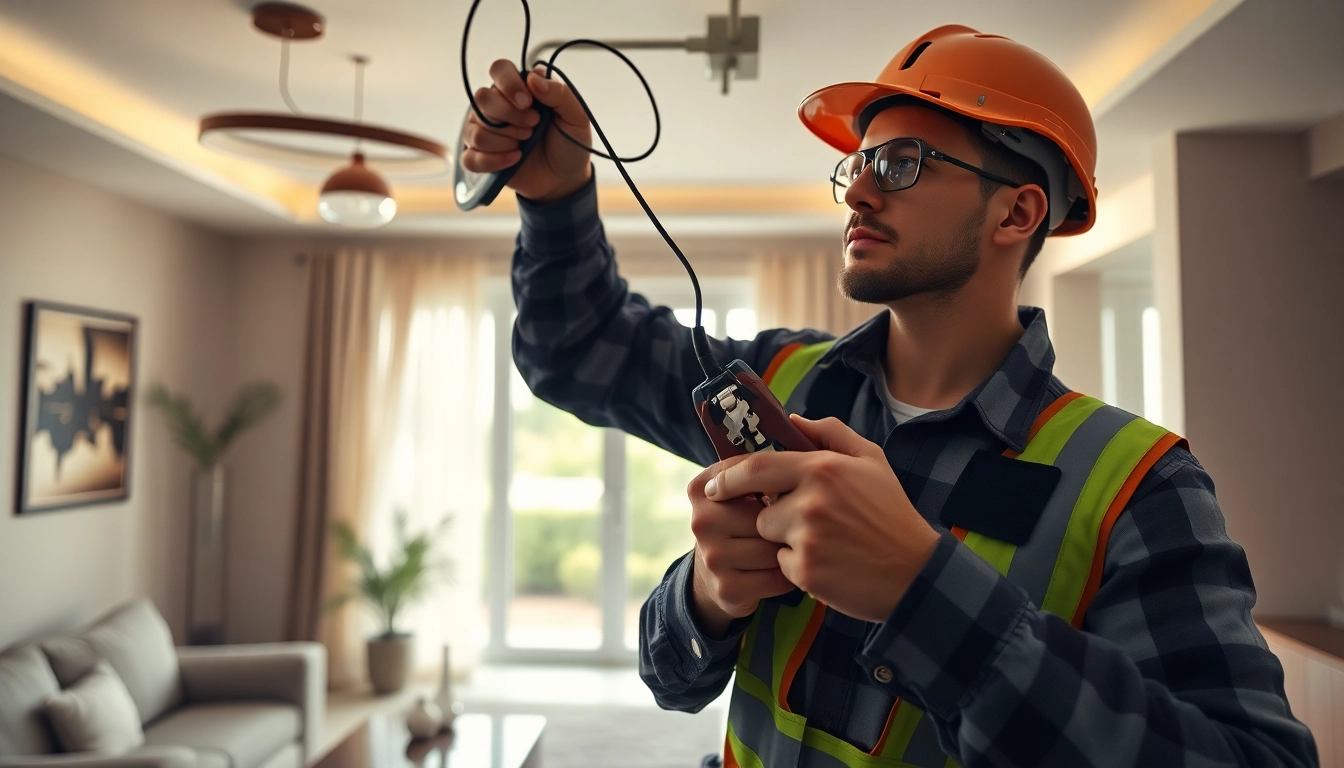Introduction to Electrical Contractors
Electrical contractors are pivotal players in construction, ensuring that buildings and other structures receive safe and effective electrical systems. These professionals manage everything related to electricity, including design, installation, and maintenance. Their work is crucial for both residential and commercial projects, profoundly impacting safety and functionality. In this article, we delve into the multifaceted role of an Electrical Contractor, exploring their responsibilities, licensing requirements, key services, best practices for collaboration, and future industry trends.
Definition and Importance of Electrical Contractors
At its core, an electrical contractor is an individual or business specializing in electrical work. This includes a wide range of activities—from wiring and lighting installation in homes to elaborate electrical systems within commercial buildings. Their importance cannot be understated; electrical contractors play a significant role in ensuring safety and compliance with local and national electrical codes.
Additionally, electrical contractors enhance efficiency through their design solutions and help meet environmental standards, especially with the rise of energy-conscious construction practices.
Common Types of Projects Handled by Electrical Contractors
Electrical contractors address various project types, such as:
- Residential Projects: These include wiring new homes, upgrading electrical panels, installing generators, and providing maintenance services.
- Commercial Projects: Contractors might work on office spaces, retail outlets, and industrial facilities, handling installations, upgrades, and energy management systems.
- Industrial Projects: This encompasses complex systems necessary for manufacturing and processing plants, involving heavy machinery and specialized equipment.
- Infrastructure Projects: Contractors may also work on public lighting, traffic signals, and other systems vital for community operation.
Skills Required to Become an Electrical Contractor
To thrive as an electrical contractor, individuals need a blend of technical knowledge and soft skills:
- Technical Skills: Proficiency in electrical systems, codes, and safety regulations is essential.
- Problem-Solving Skills: Complex projects often present unexpected challenges, requiring quick and innovative solutions.
- Management Skills: Contractors must manage teams, budgets, and deadlines effectively.
- Communication Skills: Interacting with clients, suppliers, and regulatory agencies necessitates clear communication.
Licensing and Certification for Electrical Contractors
Understanding Licensing Requirements
Licensing for electrical contractors varies by state and locality but generally requires meeting educational and experience standards. Most regions mandate that contractors hold specific licenses to perform electrical work legally. This usually involves passing examinations that assess knowledge of electrical codes, safety practices, and trade principles.
It’s crucial for contractors to stay informed about local regulations and ensure all required licenses are up-to-date, as operating without a license can lead to hefty fines and legal repercussions.
Certifications that Benefit Electrical Contractors
In addition to basic licensing, there are various certifications available that can enhance a contractor’s credibility and marketability:
- National Electrical Contractors Association (NECA) Certification: A certification that signifies adherence to industry standards.
- Certified Electrician Technician (CET): Focuses on advanced skills and knowledge in electrical systems.
- Green Electrical Contractor Certification: Demonstrates knowledge and commitment to sustainable practices in electrical installation and maintenance.
The Process of Obtaining a License
Obtaining an electrical contractor’s license typically involves several key steps:
- Education and Training: Most states require completion of a formal educational program and apprenticeship.
- Experience Requirements: Candidates usually need a certain number of hours working under a licensed contractor.
- Examination: Prospective contractors must pass a state-administered examination to demonstrate their knowledge.
- Application Submission: After passing, applicants must submit documentation and fees to the state regulatory board.
Key Services Offered by Electrical Contractors
Residential Electrical Services
Residential electrical services encompass a wide array of tasks designed to keep a home’s electrical systems efficient and safe:
- New Construction Wiring: Installations for new homes, ensuring all circuits and fixtures meet current codes.
- Renovations: Upgrading or relocating electrical systems during home modifications.
- Electrical Inspections: Comprehensive checks to ensure safety and compliance with regulations.
- Emergency Repairs: Quick response services for electrical emergencies, ensuring home safety.
Commercial Electrical Services
In commercial settings, the scope of work often includes:
- Lighting Design and Installation: Efficient lighting solutions tailored to business needs.
- Power Distribution Systems: Designing systems for optimal energy distribution across facilities.
- Data and Communication Wiring: Installation of systems for internet and telecommunication needs.
- Maintenance Contracts: Regular servicing to minimize downtime and ensure reliability.
Specialized Services in Electrical Contracting
Beyond standard offerings, electrical contractors may provide specialized services such as:
- Fire Alarm Systems: Installation and maintenance of life-saving fire alarm technology.
- Surveillance Systems: Security measures tailored to business requirements.
- Generator Installation: Planning and implementing backup power systems for homes and businesses.
- Smart Home Technology: Integration of advanced systems for home automation and energy efficiency.
Best Practices in Working with Electrical Contractors
How to Choose the Right Electrical Contractor
Choosing the right electrical contractor hinges on several considerations:
- Experience: Look for contractors with significant experience in your specific project type.
- References: Request references or portfolios to gauge past work quality.
- Licensing: Always verify that the contractor holds the necessary licenses for your area.
- Insurance: Confirm that the contractor is insured, protecting you from potential liabilities.
Questions to Ask Before Hiring
Before hiring an electrical contractor, ask the following:
- What specific services do you offer that relate to my project?
- Can you provide a detailed proposal with estimated timelines and costs?
- What safety measures do you implement during a project?
- How do you handle project changes or unexpected issues?
Understanding Quotes and Contracts
When it comes to quotes and contracts, ensure clarity and mutual understanding:
- Itemized Estimates: Request detailed quotes that break down costs for labor, materials, and any other fees.
- Contract Terms: Understand all terms before signing, including payment schedules and project timelines.
- Warranties: Verify any warranties on workmanship or materials as part of the contract.
Future Trends in Electrical Contracting
Emerging Technologies Impacting the Electrical Industry
The electrical contracting landscape is rapidly evolving, influenced by emerging technologies such as:
- Smart Grids: Innovations in power transmission that enhance efficiency and reliability.
- Renewable Energy Systems: Installation of solar panels and wind systems is becoming more prevalent in residential and commercial sectors.
- Building Information Modeling (BIM): Advanced modeling techniques aid in project planning and management.
Sustainability Practices in Electrical Contracting
As environmental concerns grow, many electrical contractors are integrating sustainability into their operations:
- Energy Efficiency: Prioritizing energy-efficient solutions in design and installation processes.
- Recycling Practices: Implementing recycling strategies for electrical waste and materials.
- Green Certifications: Seeking certifications that recognize environmentally friendly practices.
Career Opportunities for Electrical Contractors
The field of electrical contracting offers various career paths, including:
- Residential Electrician: Focus on domestic projects and electrical systems.
- Commercial Electrician: Specialization in commercial installations and maintenance.
- Project Manager: Overseeing larger projects, managing teams and budgets.
- Consultant: Providing advisory services based on expertise in electrical systems.
As we look towards the future, training, adaptation to new technologies, and an emphasis on sustainable practices will continue to shape the landscape of electrical contracting. By understanding the full spectrum of responsibilities and opportunities, individuals and businesses can make informed decisions in this dynamic field.



